
News
Behind the Headlines
Two-Cents Worth
Video of the Week
News Blurbs
Articles
Testimony
Bible Questions
Internet Articles (2016)
Internet Articles (2015)
Internet Articles (2014)
Internet
Articles (2013)
Internet Articles (2012)
Internet Articles (2011)
Internet Articles (2010)
Internet Articles
(2009)
Internet Articles (2008)
Internet Articles (2007)
Internet Articles (2006)
Internet Articles (2005)
Internet Articles (2004)
Internet Articles (2003)
Internet Articles (2002)
Internet Articles (2001)

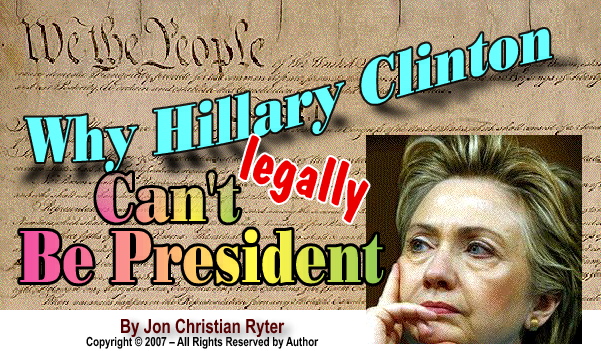
Author's Note: I originally wrote and posted this article on my website on June 13, 2004. The URL was hit 11.4 million times in a two-day period and was the most read article on www.jonchrisitanryter.com in the history of my website. At least one well-recognized constitutional lawyer agreed with the view of the article that, without a Constitutional amendment degenderizing Article II of the Constitution, Hillary Rodham Clinton cannot constitutionally seek—or legally hold—the office of President of the United States. That, of course will not stop the former First Lady and current junior Senator from New York from running anyway and attempting to amend the US Constitution by precedent. If no one files a petition before the US Supreme Court (which is the only court with jurisdiction over this question) and should Hillary win, the Constitution will have been amended by common practice—erasing Article II and opening the door wide for the elimination of the 2nd Amendment of the Constitution using the same tactics.
In point of fact, about the time this article appeared in 2004, an effort was being made to enact what became known as "the Arnold Amendment" that was purportedly designed to change the laws of the land to provide for naturalized citizens like California Gov. Arnold Schwarzenegger and Michigan Gov. Jennifer Granholm to legally seek the office of President of the United States. The Arnold Amendment was really the Screw America Amendment since it was covertly designed to legalize Hillary Clinton's run for the roses. Since Hillary knows that 60% of the American people—men and women—will never vote for her, telling people the purpose of the Arnold Amendment was to degenderize Article II of the Constitution, the amendment would be a nonstarter. But then, even without being told, most people figured it out for themselves because the Arnold Amendment appears to be stuck in limbo.
![]() ven
before his term of office expired at noon on January 20, 2001, President
William Jefferson
Clinton was quietly
querying friendly members of the US Supreme Court to see if they
would be inclined to rule that the 22nd Amendment prevented
a president from serving more than two terms in the White House,
or if there might be five justices on the high court who could be
legally persuaded that the 22nd Amendment didn't exclude
the president from serving more than two terms, only that it prevented
him from serving more than two consecutive terms. If the Justices
could be convinced to frame a ruling based on what Clinton believed was "the spirit" in which the 22nd Amendment was offered for ratification rather than the high court adhering
to the letter of the language within the amendment, Clinton might have been able to return to the presidential political arena
in 2004 and challenge the son of his old nemesis. However, the consensus Clinton sought from the justices of the high court escaped
him. It was the view of the US Supreme Court that the 22nd Amendment was clear and unambiguous. No man could hold the office of President
for more than two terms. And, any president serving two years and
one day of the unexpired term of a former president was ineligible
to seek reelection at all.
ven
before his term of office expired at noon on January 20, 2001, President
William Jefferson
Clinton was quietly
querying friendly members of the US Supreme Court to see if they
would be inclined to rule that the 22nd Amendment prevented
a president from serving more than two terms in the White House,
or if there might be five justices on the high court who could be
legally persuaded that the 22nd Amendment didn't exclude
the president from serving more than two terms, only that it prevented
him from serving more than two consecutive terms. If the Justices
could be convinced to frame a ruling based on what Clinton believed was "the spirit" in which the 22nd Amendment was offered for ratification rather than the high court adhering
to the letter of the language within the amendment, Clinton might have been able to return to the presidential political arena
in 2004 and challenge the son of his old nemesis. However, the consensus Clinton sought from the justices of the high court escaped
him. It was the view of the US Supreme Court that the 22nd Amendment was clear and unambiguous. No man could hold the office of President
for more than two terms. And, any president serving two years and
one day of the unexpired term of a former president was ineligible
to seek reelection at all.
There had been idle chatter in Democratic circles in 2004 that Democratic presidential nominee John Kerry might offer the vice presidential slot to Bill Clinton—even though Hillary tried hard to buy it for herself. However, the 22nd Amendment prevented Bill Clinton from being placed on the ticket as Kerry's vice presidential running mate just as Article II of the Constitution prevents Hillary Clinton from constitutionally assuming for the job. In fact, for precisely the same reason that Bill Clinton couldn't serve as vice president, neither can Hillary.
Why? Because she couldn't constitutionally fill the vacancy caused by the death, resignation, impeachment and removal of any US president under whom she served. The Constitution of the United States actually prevents Hillary—or any woman for that matter—from ascending to the office of President even though several women have already run for the office.
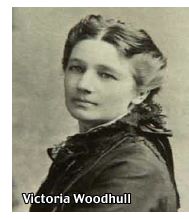 The
first woman to run for President of the United States was Victoria
Woodhull, a stockbroker and "protégé"
of railroad tycoon Cornelius Vanderbilt. Woodhull ran for President on the Equal Rights Party ticket in 1872. Belva Lockwood, the first woman admitted to practice law
before the US Supreme Court became that party's candidate for president
in 1884 and 1888. Both women ran on a platform for which there was
no constituency that would vote for them—not even themselves.
Neither woman could vote. Womanhood did not get the vote until the
ratification of the 19th Amendment on Aug. 18, 1920.
The
first woman to run for President of the United States was Victoria
Woodhull, a stockbroker and "protégé"
of railroad tycoon Cornelius Vanderbilt. Woodhull ran for President on the Equal Rights Party ticket in 1872. Belva Lockwood, the first woman admitted to practice law
before the US Supreme Court became that party's candidate for president
in 1884 and 1888. Both women ran on a platform for which there was
no constituency that would vote for them—not even themselves.
Neither woman could vote. Womanhood did not get the vote until the
ratification of the 19th Amendment on Aug. 18, 1920. 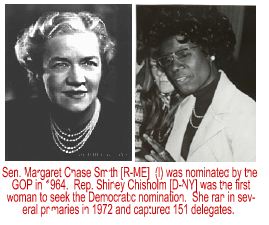 While
the 19th Amendment provided women with the right to vote,
it did not provide them the right to seek the highest office in
the land—a legality that has been overlooked by office seekers,
male and female, since 1920.
While
the 19th Amendment provided women with the right to vote,
it did not provide them the right to seek the highest office in
the land—a legality that has been overlooked by office seekers,
male and female, since 1920.
In 1964 US Senator Margaret Chase Smith [R-ME] became the first woman to have her name placed in nomination for President by a major political party. Smith was nominated by Sen. George Aiken that year. The nomination went to Arizona Sen. Barry Goldwater who lost in the general election to President Lyndon B. Johnson.
Because women were not viable candidates for the office of the President, their candidacy was viewed only as evidence that the party hierarchy, whether Democrat or Republican, was solidly behind women's suffrage—particularly when the National Organization of Women [NOW] became a strong feminist advocacy voice in American politics in the 1960s.
In 1984, pressured by NOW to place a woman on the ticket, Walter "Fritz"
Mondale (who was running against Ronald Reagan and George
H.W. Bush) selected Congresswoman  Geraldine
Ferraro [D-NY] as his running mate. Although Mondale and Ferraro lost in the biggest election upset since 1820
when John Quincy Adams won only one electoral vote in his
fight to win the presidency from James Madison, Ferraro has the distinction of going into the history books as the first
female vice presidential nominee of a major political party.
Geraldine
Ferraro [D-NY] as his running mate. Although Mondale and Ferraro lost in the biggest election upset since 1820
when John Quincy Adams won only one electoral vote in his
fight to win the presidency from James Madison, Ferraro has the distinction of going into the history books as the first
female vice presidential nominee of a major political party.
Mondale entered the history books as the man who won only his home State of Minnesota—and its 13 electoral votes—in the Election of 1984. Had Mondale won the election, a Constitutional crisis would have resulted since Ferraro could not have legally succeeded Mondale if he died in office or otherwise became incapacitated without a clarification from the US Supreme Court, or through a constitutional amendment that erases the gender distinctions in Article II, Section 1. In an interesting side note to Ferraro's candidacy in 1984, the Republicans captured 57% of all of the female votes that year. It seems that, other than the diehard party loyalists and feminists, not even the working class women of America wanted a woman anywhere near the White House—except as First Lady.
Few Americans are cognizant of the fact that an important legal question exists that has not been constitutionally addressed. They believe that because that because the 19th Amendment gives women the right to vote, and because women serve in Congress, that the office of President of the United States has been degenderized. Not true. The 19th Amendment merely removed the barriers that prevented women from voting—not holding the highest office in the land. The 19th Amendment says: "The right of citizens of the United States to vote shall not be denied or abridged by the United States or by any State on account of sex." Had the amendment said, "...the right of citizens of the United States to vote or hold public office shall not be denied..." then the 19th Amendment would have done what the feminists claim it did—degenderize the office of the President of the United States. But, they didn't. And, it didn't.
The Susan B. Anthony Amendment (as it was known) passed in the House by a vote of 304 to 89. (It was called the Susan B. Anthony Amendment because the words were actually drafted by the suffragist in 1875 when she tried to get Congress to at least debate the measure. The Senate passed the amendment resolution on a vote of 56 to 25. (Fifty-six Senate Republicans and 20 Democrats voted for passage of the Amendment.) Both the House and Senate deliberately avoided adding language that would allow women the right to seek the highest office in the land because most Senators on both sides of the aisle were in doubt of the Amendment being ratified by the 36 States needed to make it the law of the land. Thus, we can conclude that the language needed to give women the right to seek the highest office of the land was deliberately missing from the debates in the 67th Congress since the Congressmen and Senators knew the 19th Amendment would not have been ratified if such a position was included.
Today's feminists believe the election process is evolutionary—legalized by common practice. They are convinced that because most Americans believe that someday a woman will be President, together with the fact that women have run—unchallenged in the courts—for the office, the male-gendered presidential office has been neutered without the need of a ruling from the Supreme Court or a constitutional amendment.
When Victoria California
Claflin Woodhull announced she was seeking the office of President
of the United States in the 1872, she was 34 years of age—one
year less than required by the Constitution. 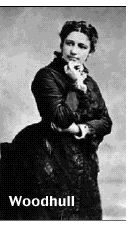 (No
one cared that she was too young to run because no one considered
her to be a real candidate.)
(No
one cared that she was too young to run because no one considered
her to be a real candidate.)
Woodhull's benefactor, Cornelius Vanderbilt, used his influence to make certain that Woodhull was allowed to run. In fact, Vanderbilt structured a bond issue to finance her campaign. The bonds would "mature" only if Woodhull was elected president—which, of course, could not happen under any circumstance since Woodhull was only 34 years old when she ran (and even moreso since her running mate was Frederick Douglas, the former slave.). Furthermore, the Woodhull-Douglas ticket was not on any ballot in any State in the union. The Equal Rights Party garnered only slightly more than 15,000 votes nationwide.
When she met Vanderbilt, Woodhull was a fortuneteller in a medicine show. As she read his palm, Vanderbilt became smitten by the sexually outspoken, gregarious woman and invited her to join him in New York. Although she was married to Dr. Canning Woodhull, the medicine show owner, she became Vanderbilt's mistress. He set Woodhull and her sister, Tennessee Claflin, up in a brokerage business, Woodhull & Claflin, on Wall Street in New York and urged his friends to do business with her.
Even though Woodhull did not meet the basic Constitutional requirements (the fact that .jpg) she
was a woman notwithstanding), the precedent allowing women to vie
for the office of the presidency was credibly established when Belva
Lockwood ran for President in 1884. Without Woodhull's
baggage, her name appeared on the ballot in several States and thus,
the confusion over whether Woodhull or Lockwood was
the first woman to run for President of the United States.
she
was a woman notwithstanding), the precedent allowing women to vie
for the office of the presidency was credibly established when Belva
Lockwood ran for President in 1884. Without Woodhull's
baggage, her name appeared on the ballot in several States and thus,
the confusion over whether Woodhull or Lockwood was
the first woman to run for President of the United States.
In any event, regardless which woman was historically construed to be the first female presidential candidate, collectively they established what the feminists today believe is the legal precedent which suggests that even though the Constitution specifically defines the President of the United States as a male, women are now construed to have a legal right to seek the office of President of the United States even though it was the firm intent of the Founding Fathers to limit that high office to men..
In Article II, Section 1, the Constitution appears to establish only three ironclad qualifications for president. The president must (1) be at least 35 years old, (2) have lived in the United States at least 14 years, and (3) be a natural-born citizen. Yet, Article II, Section 1 declares that the President will be a man 16 times. Further, as noted by J.A. Corry, principal of Queen's University in London, and Henry J. Abraham, Professor of Political Science at the University of Pennsylvania, in their political science text book, Elements of Democratic Government (©1964; Oxford University Press) that in addition to the "written" qualifications for the office, there are also several "unwritten" qualifications and customary requirements that precedent has added to the qualifications for the office of President of the United States. Corry and Abraham insist these prerequisites must be viewed in the light of the entire composite. Being male is necessarily one of them.
Moreover, the Founding Fathers specifically wrote into the Constitution a male-gendered office called President. Article II, Section 1 begins: "The executive power shall be vested in a President of the United States of America. He shall hold his office during the term of four years, and with the Vice President, chosen for the same term, be elected as follows..." You really do not have to read further to realize the role of President of the United States is gender-specific. Note the qualifications for the office of Congressman found in Article I, Section 1:
"The
House of Representatives shall be composed of members chosen every
second year by the people of the several States...No person shall
be a Representative who shall not have attained the age of 25 years,
and been 7 years a citizen of the United States, and who shall not,
when elected, be an inhabitant of that State in which he shall be
chosen..." There
is no gender specification in the description of a Congressman.
Nor is there any in the qualifications for Senator found in Article
I, Section 2: "The Senate of the
United States shall be composed of two Senators from each State
chosen by the legislature thereof...No person shall be a Senator
who shall have attained the age of 30 years, and been 9 years a
citizen of the United States, and who shall not, when elected, be
an inhabitant of that State for which he shall be chosen." Only one time, in one sentence, in Article I are the members of
the House and/or Senate collectively referred to in male gender,
and that is in Section 6, paragraph 2. In that instance,
the usage is basically generic since there is no individual gender
specific reference made for an individual person. In this single
instance, the Constitution is clarifying that Congressmen and Senators
may not serve a dual role in the Executive Branch of government.
Four times in Article I, Section 7 the President is referred to specifically as a man. Again, this was not an accident. The President is referred to, by gender, a total of 20 times in the Constitution. Most constitutional scholars agree that the Founding Fathers intended to establish a male gender national leader. In doing so, they explicitly barred women from ever becoming the President of the United States without first enacting a constitutional amendment that would allow them to accept the office if elected (since there appears to be nothing that bars them from seeking the office—only serving it if elected). In his book, "America's Constitution: A Guided Tour," Yale law professor Akhill Reed Amar suggests that the 19th Amendment, which gave women the right to vote, also granted them the implied corresponding right to seek the office of President of the United States. "In effect," he said, "that amendment required that the word 'he' in the original constitutional clauses dealing with the president would henceforth be read to mean 'he' or 'she.'"
Amar is, unfortunately, "reading" words or meanings not in evidence. The 19th Amendment merely grants women the right to vote. Although liberals have mastered the art of creating supra rights in existing case law by implication, there is no implied corresponding right to be construed here—particularly for women seeking the office of President of the United States which, constitutionally, is uniquely a male job. Sexist, isn't it?
Simply stated, the 19th Amendment says: "The right of citizens of the United States to vote shall not be denied or abridged by the United States or by any State on account of sex. Congress shall have the power to enforce this article by appropriate legislation." Granted, starry-eyed liberals will automatically see the expansive nature of the phrase "...shall not be...abridged..." and will expand that phrase sufficiently to drive a Mack truck through it since the entire Civil Rights Acts of 1964 and 1968 were crafted from the "commerce clause" in Article I, Section 8. But the simple truth is that all the 19th Amendment does is provide women with the right to vote in federal, State, county and local elections. While women have never been denied the right to seek public office (even when they could not vote for themselves or for other female candidates for office), there is nothing in the 19th Amendment (or any other amendment for that matter) that neutralizes the gender specific qualities required of those who become the President of the United States.
Without
looking too far beyond the tip of our noses, we will find several
liberal federal judges—particularly female judges—who
would vehemently argue that the 19th Amendment's vote-granting
to the "fair sex" tacitly degenderized all masculine references
to the office of President. That argument has legal merit only if
you can honestly conclude, after reading the entire document, that
the Founding Fathers did not intend to create a national leader
who was specifically male.
Remember, at that time there were many female monarchs in Europe, so the notion of female heads of state was not alien to their thinking. And, while the door was not closed to women seeking government office, the Founding Fathers visualized the national leader of the United States as a man—and they deliberately penned that perspective into the Constitution. If that hypothesis is correct, then a woman cannot constitutionally serve as President of the United States until a constitutional amendment is ratified to correct the presumption by the Founding Fathers that the President of the United States must be a man.
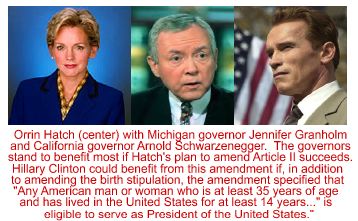 What
does that mean for Sen. Hillary Clinton's aspirations to
somehow become the 44th President of the United States? It means
she should be thankful she has a job as the US Senator of the second
most liberal State in the Union. Unless, of course, Hillary and the feminists in the House and Senate can join Sen. Orrin
Hatch's [R-UT] and become cosponsors of Hatch's latest
effort to weaken the Constitution. Hatch has proffered a
revolutionary new constitutional amendment that will weaken the
requirements needed for a candidate to run for the presidency. The
latest Hatch Amendment that will trigger a constitutional
amendment resolution if it is successfully attached to any piece
of legislation going through Congress, seeks to eliminate the "naturally-born"
clause from Article II, Section 1. That would be the perfect
opportunity for the feminists to redefine the good ol' boy genderization
of the office of President (while only a few people realize that
the current wording does constitutionally prevent women from holding
the office of President.
What
does that mean for Sen. Hillary Clinton's aspirations to
somehow become the 44th President of the United States? It means
she should be thankful she has a job as the US Senator of the second
most liberal State in the Union. Unless, of course, Hillary and the feminists in the House and Senate can join Sen. Orrin
Hatch's [R-UT] and become cosponsors of Hatch's latest
effort to weaken the Constitution. Hatch has proffered a
revolutionary new constitutional amendment that will weaken the
requirements needed for a candidate to run for the presidency. The
latest Hatch Amendment that will trigger a constitutional
amendment resolution if it is successfully attached to any piece
of legislation going through Congress, seeks to eliminate the "naturally-born"
clause from Article II, Section 1. That would be the perfect
opportunity for the feminists to redefine the good ol' boy genderization
of the office of President (while only a few people realize that
the current wording does constitutionally prevent women from holding
the office of President.
It is unclear why Hatch chose that time to proffer that amendment since it will likely benefit the Democrats far more than his own party. At this moment, Hatch's resolution would affect two high profile up-and-coming politicians. First is Gov. Jennifer Granholm [D-MI], who is the rising star of the Democratic Party. Second is Gov. Arnold Schwarzenegger [R-CA], a moderate Kennedy Republican who is, unfortunately greatly influenced by Hatch's across the aisle buddy, Uncle Teddy Kennedy. But, as I said, the person who would benefit most if an amended version of Hatch's resolution becomes a constitutional amendment will be Sen. Hillary Clinton who would suddenly not have to worry about testosterone court challenges as she continues to battle her peers for the Democratic nomination for the office of President of the United States.
copy-text-copy

Copyright © 2009 Jon Christian Ryter.
All rights reserved.


